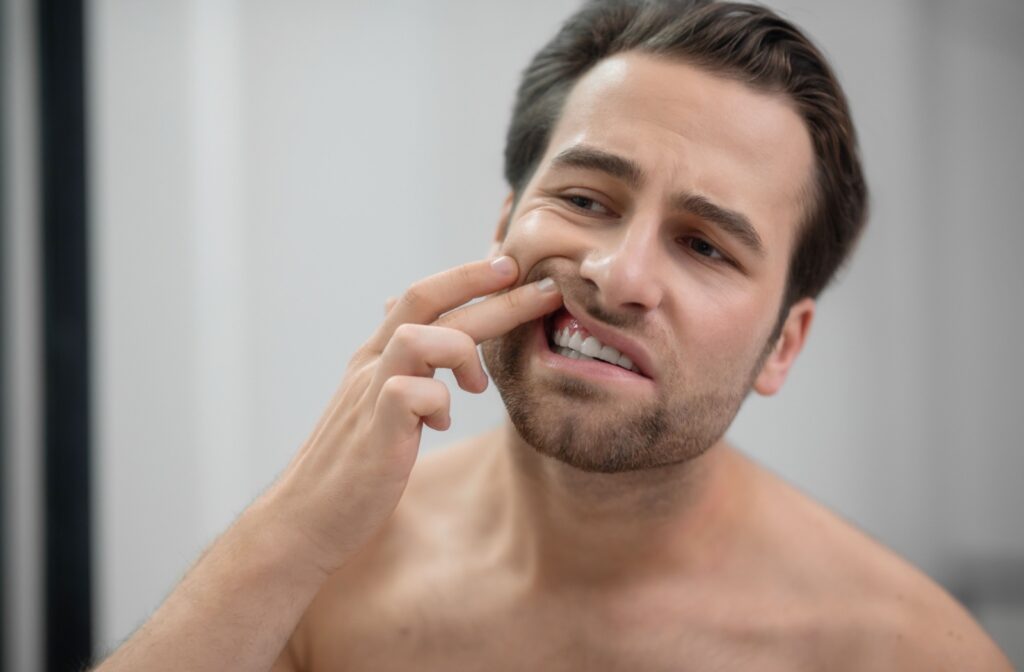Many common dental issues are preventable—as long as you have the right habits and knowledge. Taking care of your teeth is often much easier than you think, but it does require a proactive approach. But what if you’re already dealing with a condition like gum recession? Can this be reversed, or is it permanent?
Gum recession can be prevented in the earliest stages of inflammation. However, as the gums recede further, this condition causes a range of uncomfortable symptoms. It’s important to keep an eye out for the signs that something’s wrong—this is key to preserving your dental health.
What Causes Gum Recession?
Gum recession occurs when the gum tissue around the teeth starts pulling back, exposing more of the tooth. As the gums recede further, they start creating little gaps between the gums and teeth. These house harmful bacteria, which can weaken the surrounding area and lead to further dental problems.
Gum recession can develop whenever bacteria build up inside the mouth. The bacteria inflames and weakens the surrounding area, which makes the infection worse. Gum recession is often caused by:
- Poor oral hygiene
- Aggressive brushing habits
- Smoking and tobacco use
- Hormonal changes
- Poor diet and nutrition
- Clenching and grinding (bruxism)
However, one of the most common causes of gum recession is simple: gum disease.
The Difference Between Gingivitis & Periodontitis
Gum disease comes in two main forms, each with its own set of symptoms and severity levels. These are:
- Gingivitis
- Periodontitis
Understanding these is the first step toward protecting your gums and smile.
What Is Gingivitis?
Gingivitis is the initial, mild stage of gum disease. It occurs when the gums are inflamed due to bacterial buildup. This is easily recognizable by:
- Visible redness in the gums
- Bleeding when brushing your teeth
- Chronic bad breath
- Swollen or sensitive gums
Gingivitis is reversible if caught early enough. However, if you don’t deal with this, it becomes periodontitis—which is much more severe.
What Is Periodontitis?
Periodontitis is a little more complex and can cause permanent damage if it progresses far enough. It develops when bacteria spread further and deeper into the gums, eventually compromising the integrity of the surrounding tissue. This can even destroy the gum tissue, teeth, and surrounding bone due to bacterial infection.
The symptoms of periodontitis include:
- Receding gums
- Visible pockets between teeth and gums
- Changes in the way your teeth fit together when biting down
- Mobile or loose teeth
If you think you’re dealing with gingivitis or periodontitis, you need to visit a dentist as soon as you can. The infection can cause significant damage, and professional help is key to preventing future problems.
The Early Signs of Gum Recession
With gum recession, early detection is crucial. It helps prevent further damage to your teeth and keep your teeth healthy and protected. The sooner you catch the symptoms, the sooner you can seek help.
Keep an eye out for:
- Teeth appearing longer than usual
- Red or inflamed gums
- Discomfort or sensitivity around the gum line
- Bleeding or discomfort when brushing your teeth
- Persistent bad breath
If you notice any of these symptoms, it’s time to take action. Book a dental exam and cleaning with your dentist so you can get checked for gum disease.

Do Gums Grow Back?
Gum recession isn’t about cosmetics. It’s a serious condition that develops due to bacterial infections and can cause significant damage if you leave it untreated.
It’s also important to note that once your gums begin receding, the damage is permanent. If you catch the symptoms before any serious damage has occurred, it’s usually manageable.
However, gums don’t grow back. So if your condition progresses to periodontitis or significant recession, you need professional care to manage your gums. Your dentist can recommend an appropriate treatment, like a gum graft, to restore your smile.
How to Prevent Gum Recession
Fortunately, preventing gum recession is often much easier than you might think. By adopting good dental hygiene practices and making a few lifestyle changes, you can significantly reduce your risk of developing this condition.
Here are some tips for keeping your gums healthy:
- Brush your teeth gently with a soft-bristle toothbrush at least twice a day.
- Floss daily to remove plaque and food particles between teeth.
- Use an antimicrobial mouthwash to kill bacteria.
- Avoid tobacco products.
- Eat a balanced diet rich in vitamins and minerals.
- Wear a nightguard if you grind your teeth.
These—alongside regular dental checkups and cleanings for early intervention with an experienced dentist—can make a big difference. You’ll be able to keep your teeth clean, your gums healthy, and your oral health in great shape.
Book Your Next Dental Exam Today
If you’re worried about gum recession, there’s no need to panic. Instead, come see our team here at Hometown Dental. Remember—regular dental checkups and professional cleanings are key to maintaining a healthy smile.
We can work together to protect your teeth and gums, so book an appointment with us today!




